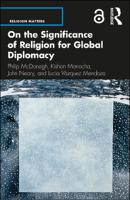On the Significance of Religion for Global Diplomacy
Proposal review
| dc.contributor.author | McDonagh, Philip | |
| dc.contributor.author | Manocha, Kishan | |
| dc.contributor.author | Neary, John | |
| dc.contributor.author | Vazquez Mendoza, Lucia | |
| dc.date.accessioned | 2020-10-29T12:36:31Z | |
| dc.date.available | 2020-10-29T12:36:31Z | |
| dc.date.issued | 2021 | |
| dc.identifier | OCN: 1247605617 | |
| dc.identifier.isbn | 9780367514358 | en_US |
| dc.identifier.isbn | 9780367514341 | en_US |
| dc.identifier.isbn | 9781003053842 | en_US |
| dc.identifier.uri | https://library.oapen.org/handle/20.500.12657/42730 | |
| dc.description.abstract | "What could it mean, in terms of strengthening multilateral diplomacy, if the UN, the Organisation for Security and Cooperation in Europe (OSCE), the European Union, and other regional diplomatic frameworks engaged more creatively with a religious perspective? In this ground-breaking volume it is argued that international organisations, backed by governments, can and should use their convening power to initiate new, multi-layered frameworks of engagement, inclusive of the representatives of religion. This can make multilateralism more fit for purpose and have a major impact over time on our planetary future. The book is divided into an introduction and six chapters: Towards a culture of encounter inclusive of the world’s religious traditions Structural questions in 21st-century diplomacy Knowing what we ought to know: the issues that face 21st-century diplomacy Towards the global objective of a common peace for humanity Understanding how change happens The diplomacy of the two standards The development of new frameworks of engagement A brief outline is offered of what an all-European initiative – an agora for Europe – might look like if, in the 2020s, there were the political will to inaugurate a European regional process reflecting the orientation and methodology proposed in the book. Combining cutting-edge research and reflection, with concrete recommendations for academics, religious actors, policy makers, and practitioners, this concise and accessible volume helps to build bridges between these oftentimes separated spheres of engagement." | en_US |
| dc.language | English | en_US |
| dc.subject.classification | thema EDItEUR::Q Philosophy and Religion::QR Religion and beliefs::QRA Religion: general::QRAM Religious issues and debates | en_US |
| dc.subject.other | Religion and politics;Religious ethics;Religion and science | en_US |
| dc.title | On the Significance of Religion for Global Diplomacy | en_US |
| dc.type | book | |
| oapen.identifier.doi | 10.4324/9781003053842 | en_US |
| oapen.relation.isPublishedBy | 7b3c7b10-5b1e-40b3-860e-c6dd5197f0bb | en_US |
| oapen.relation.isFundedBy | Dublin City University | |
| oapen.imprint | Routledge | en_US |
| oapen.pages | 182 | en_US |
| peerreview.anonymity | Single-anonymised | |
| peerreview.id | bc80075c-96cc-4740-a9f3-a234bc2598f1 | |
| peerreview.open.review | No | |
| peerreview.publish.responsibility | Publisher | |
| peerreview.review.stage | Pre-publication | |
| peerreview.review.type | Proposal | |
| peerreview.reviewer.type | Internal editor | |
| peerreview.reviewer.type | External peer reviewer | |
| peerreview.title | Proposal review | |
| oapen.review.comments | Taylor & Francis open access titles are reviewed as a minimum at proposal stage by at least two external peer reviewers and an internal editor (additional reviews may be sought and additional content reviewed as required). |

